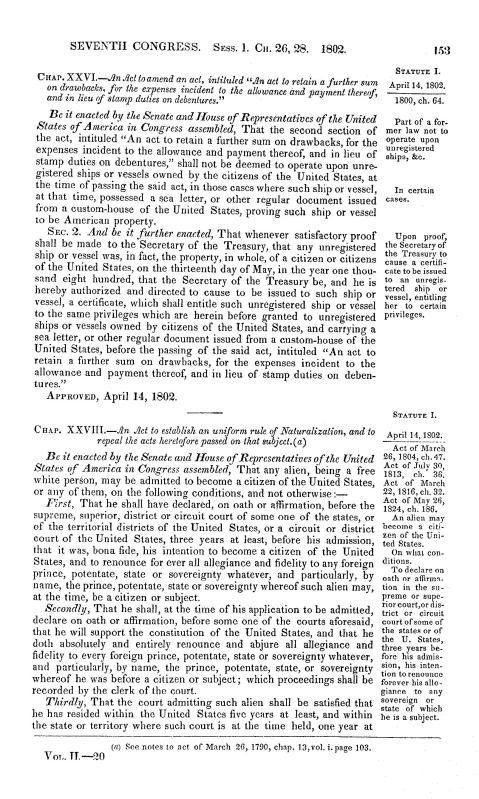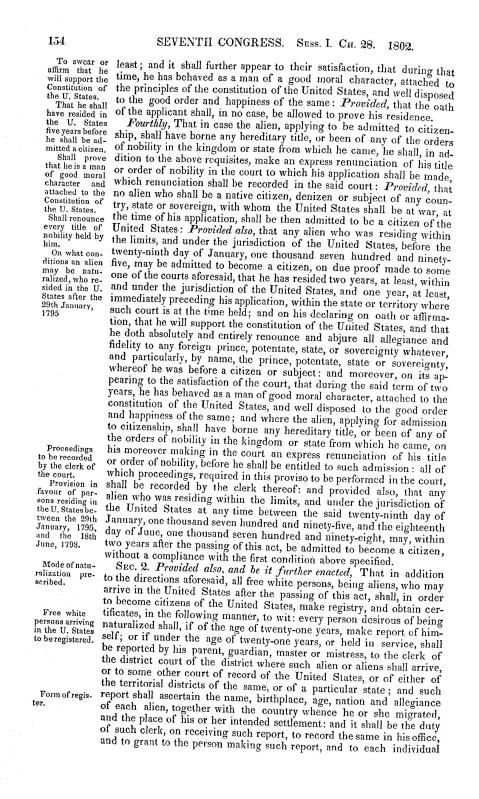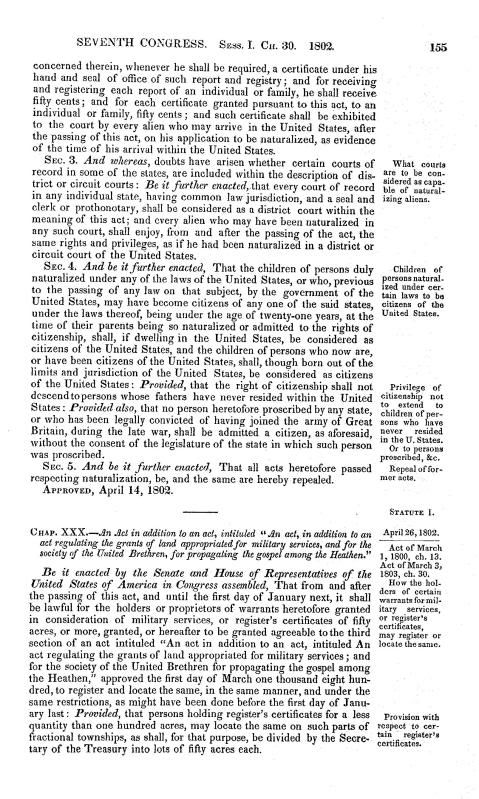Real0ne
Posts: 21189
Joined: 10/25/2004
Status: offline

|
quote:
ORIGINAL: xssve
quote:
geezus allfucking ready! rights are NOT GIVEN. They are inherent. PRIVILEGES and IMMUNITIES are granted. There is a HUGE distinction between the 2
How exactly are rights inherent?
You know I have been on this board for years and harping on this shit and I thought no one would ever get to this an actually challenge me on it. Cheers for you!
Rights are by claim!
Any court will tell you that if you do not know your rights it is NOT their duty to teach them to you! Any "good" law enyclopedic dictionary will illustrate those distinctions. This is from one of a series the supreme court uses as their source.
Hence if you are not savvy enough to understand the differences between government granted license (privileges and immunities) and a right then you MUST be under the loving guidance of the government since you have no moral compass and have no ability to guide yourself. Athiests you listening? LOL
quote:
RIGHT. A well-founded claim.
2* If people believe that humanity itself establishes or proves certain claims, either upon fellow-beings, or upon society or government, they call these claims human rights; if they believe that these claims inhere in the very nature of man himself, they call them inherent, inalienable rights; if people believe that there inheres in monnarchs a claim to rule over their subjects by divine appointment, they call the claim divine right, jus divinum; if the claim is founded or given by law, it is a legal right. [law of the contract] The ideas of claim and that the claim must be well founded always constitute the idea of right. Rights can only inhere in and exist between moral beings; [a state is NOT a moral being and never can be, it is an abstract artifice of man, or artificial entity] and no moral beings can coexist without rights, consequently without obligations. Right and obligation are correlative ideas. The idea of a well-founded claim becomes in law a claim founded in or established by the law: so that we may say a right in law is an acknowledged claim.
[I have the perfect right to protect myself and exclusive possession and use of my property and an obligation not to use that property in a manner that violates the rights of another.]
Men are by their inherent nature moral and social beings: they have, therefore, mutual claims upon one another. Every well-grounded claim on others is called a right, [today the law operates on presumption NOT well grounded claims] and, since the social character of man gives the element of mutuality to each claim, every right conveys along with it the idea of obligation. Right and obligation are correlatives. The consciousness of all constitutes the first foundation of the right or makes the claim well grounded. Its incipiency arises instinctively out of the nature of man. Man feels that he has a right of ownership over that which he has produced out of appropriated matter,—for instance, the bow he has made of appropriated wood; he feels that he has a right to exact obedience from his children, long before laws formally acknowledge or protect these rights; but he feels, too, that if he claims the bow which he made as his own, he ought to acknowledge (as correlative obligation) the same right in another man to the bow which he may have made; or if he, as father, has a right to the obedience of his children, they have a corresponding claim on him for protection as long as they are incapable to protect themselves. The idea of rights is coexistent with that of authority (or government); both are inherent in man; but if we understand by government a coherent system of laws by which a state is ruled, and if we understand by state a sovereign society, with distinct authorities to make and execute laws, then rights precede government, or the establishment of states, which is expressed in the ancient law maxim: No ex regula jus suinatur, sed ex jure quod ect, regula fiat. See Government. We cannot refrain from referring the reader to the noble passage of Sophocoles, Edyp. Tyr. 876 et seq., and to the words of Cicero, in his oration for Milo: Est enim haec, judices, non scripta sed nata lex; quam non didicimus, acccpimus, legimus; verum ox natura ipsa arripuimus, hausimus, oxprcssiinus; ad quam non docti sed facti; non instituti sed imbuti sum us.
3. As rights precede government, so we find that now rights are acknowledged above governments and their statecs, in the case of international law. International law is founded on rights, that is, well-grounded claims which civilized states, as individuals, make upon one another. As governments come to be more and more clearly established, rights are more clearly acknowledged and protected by the laws, and right comes to mean a claim acknowledged and protected by the law.
A legal right, a constitutional right, means a right protected by the law, [but they are not! you pay taxes on your property regardless if you consent to not, you dont just pay a charge for services requested] by the constitution; but government does not create the idea of right or original rights; it acknowledges them; just as government does not create property or values and money, it acknowledges and regulates them. If it were otherwise, the question would present itself, whence docs government come? whence does it derive its own right to create rights? By compact? But whence did the contracting parties derive their right to create a government that is to make rights? We would be consistently led to adopt the idea of a government by jus divinum,—that is, a government deriving its authority to introduce and establish rights (bestowed on it iu particular) from a source wholly separate from human society and the ethical character of man, in the same manner in which we acknowledge revelation to come from a source not human. [meaning the Sovereign monarch, small world, who claimed themselves to be or to be the equivalent of God when creating this sytem]
4. Rights are claims of moral beings upon one another: when we speak of rights to certain things, they are, strictly speaking, claims of persons on persons,—in the case of property, for instance, the claim of excluding others from possessing it. The idea of right indicates an ethical relation, and all moral relations may be infringed; claims may be made and established by law which are wroDg in themselves and destitute of a corollary obligation; they are like every other wrong done by society or government; they prove nothing concerning the origin or essential character of rights. On the other hand, claims are gradually more clearly acknowledged, and new ones, which were not perceived in early periods, are for the first time perceived, and surrounded with legislative protection, as civilization advances. Thus, original rights, or the rights of man, are not meant to be claims which man has always perceived or insisted upon or protected, but those claims which, according to the person who uses the term, logically flow from the necessity of the physical and moral existence of man ; for mun is born to be a man,—that is, to lead a human existence. They have been called inalienable rights; but they have been alienated, and many of them are not perceived for long periods. Lieber, in his Political Ethics, calls them primordial rights: he means rights directly flowing from the nature of man, developed by civilization, and always showing themselves clearer and clearer as society advances, lie enumerates, as such especially, the following: the right of protection; the right of personal freedom,—that is, the claim of unrestricted action except so far as the same claim of others necessitates restriction: these two rights involve the right to have justice done by the public administration of justice, the right of production and exchange (the right of property), the right of free locomotion und emigration, the right of communion in speech, letter, print, the right of worship, the right of influencing or sharing in the legislation. All political civilization steadily tends to bring out these rights clearer and clearer, while in the course of this civilization, from its incipient, with its relapses, they appear more or less developed in different periods and frequently wholly in abeyance: nevertheless, they have their origin in the personality of man as a social being.
Publicists and jurists have made the following further distinction of rights:
5. Rights are perfect and imperfect. When the things which we have a right to possess), or the actions we have a right to do, are or may he fixed and determinate, the right is a nerfect one; but when the thing or the actions are vague and indeterminate, the right is an imperfect one. If a man demand his property which is withheld from him, the right that supports his demand is a perfect one. because the thing demanded is or may be fixed and determinate; but if a poor man ask relief from those from whom he has reason to expect it, the right which supports his petition is an imperfect one, because the relief which he expects is a vague, indeterminate thing. Rutherforth, lust. c. 2, J 4; Grotius, lib. 1, c. 1, \ 4.
6. Rights are also absolute and qualified. A man has an absolute right to recover property which belongs to him; an agent has a qualified right to recover such property when it had beeu intrusted to his care, and which has been unlawfully taken out of his possession.
Rights might with propriety be also divided into natural and civil rights; but as all the rights which man has received from nature have been modified and acquired anew from the civil law, it is more proper, when considering their object, to divide them into political and civil rights.
7. Political rights consist in the power to participate, directly or indirectly, in the establishment or management of government. These political rights are fixed by the constitution. Every citizen has the right of voting for public officers, and of being elected: these are the political rights which the humblest citizen possesses.
Civil rights are those which have no relation to the establishment, support, or management of the government. These consist in the power of acquiring and enjoying property, of exercising the paternal and marital powers, and the like. It will be observed that every one, unless deprived of them by a sentence of civil death, is in the enjoyment of his civil rights,—which is not the case with political rights; for an alien, for example, has no political, although in the full enjoyment of his civil, rights.
8. These latter rights are divided into absolute and relative. The absolute rights of mankind may be reduced to three principal or primary articles: the right of personal security, which consists in a person's legal and uninterrupted enjoyment of his life, his limbs, his body, his health, and his reputation; the right of personal liberty, which consists in the power of locomotion, of changing situation or removing one's person to whatsoever place one's inclination may direct, without any restraint unless by due course of lawt the right of property, which consists in the free use, enjoyment, and disposal of all his acquisitions, without any control or diminution save only by the laws of the land. 1 Blackstone, Comm. 124-139.
9. The relative rights are public or private: the first are those which subsist between the people and the government; as, the right of protection on the part of the people, and the right of allegiance which is due by the people to the government: the second are the reciprocal rights of husband and wife, parent and child, guardian and ward, and master and servant.
Rights are also divided into legal and
equitable. The former are those where the party has the legul title to a thing; and in that case his remedy for an infringement of it is by an action in a court of law. Although the person holding the legal title may have no actual interest, but hold only as trustee, the suit must be in his name, and not, in general, in that of the cestui que trust. 1 East, 497 ; 8 Term, 332; 1 Saund. 158, n. 1; 2 Bingh. 20. The latter, or equitable rights, are those which may be enforced in a court of equity by the cestui que trust. See, generally, Bouviur, Inst. Index.
You have the right to religion as long as you do not act upon it.
you have the right to own and bear arms as long as you do not act upon it
you have the right to free speech as long as you do not burn the flag
you have the right to a jury of your peers as long as there is no stare decis
you have the right to be destroyed by attrition by a MOB with endless funds
you have lots of rights.
you have the right to have your assholes sandpapered by an outlaw deMOBcratic society called government
< Message edited by Real0ne -- 2/28/2012 9:16:08 AM >
_____________________________
"We the Borg" of the us imperialists....resistance is futile
Democracy; The 'People' voted on 'which' amendment?
Yesterdays tinfoil is today's reality!
"No man's life, liberty, or property is safe while the legislature is in session
|


 Profile
Profile








 New Messages
New Messages No New Messages
No New Messages Hot Topic w/ New Messages
Hot Topic w/ New Messages Hot Topic w/o New Messages
Hot Topic w/o New Messages Locked w/ New Messages
Locked w/ New Messages Locked w/o New Messages
Locked w/o New Messages Post New Thread
Post New Thread